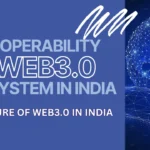Introduction: Web3.0 for Social Good in India
Web3.0 for social good in India holds the potential to transform key sectors by leveraging blockchain and decentralized applications (dApps). With its transparency, decentralization, and security, Web3 is poised to tackle some of India’s most pressing social challenges, from financial inclusion to environmental sustainability. As this technology continues to evolve, its ability to foster positive social impact is becoming more evident, offering new opportunities for innovation and progress.
Key Areas of Social Impact in India Through Web3.0
1. Financial Inclusion: Empowering Underserved Communities
In India, Web3.0 for social good is playing a pivotal role in promoting financial inclusion. Decentralized finance (DeFi) protocols enable people without access to traditional banking services to participate in the financial system. By offering low-cost loans, secure transactions, and global remittance services, Web3.0 is bridging the gap between the underserved and essential financial services.
Key Benefits:
- DeFi reduces transaction fees and eliminates intermediaries.
- Blockchain simplifies microfinance, making financial services more accessible.
| Benefit | Impact on Financial Inclusion |
|---|---|
| Lower Transaction Costs | Makes financial services affordable |
| Faster Transactions | Quick access to credit and loans |
| Global Remittance | Easier transfers to remote areas |
2. Healthcare: Enhancing Security and Efficiency
Web3.0 for social good is also making strides in the healthcare sector. Blockchain’s ability to ensure secure medical records and optimize healthcare supply chains is crucial for improving accessibility and reducing fraud. Patients in India can benefit from privacy-preserving technologies while ensuring better management of medical resources.
Key Benefits:
- Medical records are secured and managed on a decentralized ledger.
- Supply chain transparency helps in tracking and reducing waste in medical resources.
| Benefit | Impact on Healthcare |
|---|---|
| Secure Medical Records | Protection of patient data |
| Efficient Supply Chain | Ensures timely and accurate medical supply |
3. Environmental Sustainability: Promoting Eco-Friendly Practices
Web3.0 for social good in India also extends to environmental sustainability efforts. Blockchain enables the tracking of carbon credits and enhances the transparency of supply chains, ensuring that sustainability practices are followed. By promoting eco-friendly behaviors, Web3.0 is contributing to India’s green future.
Key Benefits:
- Blockchain verifies carbon credits, fostering accountability in carbon reduction efforts.
- It helps trace the origins of products, ensuring ethical sourcing and production.
| Benefit | Impact on Environment |
|---|---|
| Carbon Credit Tracking | Promotes green initiatives |
| Supply Chain Transparency | Reduces unethical practices |
4. Education: Ensuring Access and Authenticity
In the education sector, Web3.0 for social good offers a solution to issues like fraud in educational credentials. By leveraging blockchain, educational institutions in India can issue verifiable digital credentials, ensuring authenticity. Additionally, personalized learning can be delivered through AI-powered dApps, making education more accessible and tailored to individual needs.
Key Benefits:
- Blockchain guarantees the authenticity of educational records.
- AI-powered dApps offer personalized learning experiences for students.
| Benefit | Impact on Education |
|---|---|
| Digital Credentials | Ensures credibility of qualifications |
| Personalized Learning | Tailored learning experiences for all students |
5. Social Impact Organizations: Enhancing Transparency in Fundraising
Web3.0 for social good in India has also empowered social impact organizations. Blockchain’s transparent nature allows for clear tracking of donations and fundraising efforts. Donors can see exactly how their contributions are being used, increasing trust and encouraging more support for social causes.
Key Benefits:
- Blockchain ensures that funds raised by social organizations are used effectively.
- Transparent processes increase donor confidence in social initiatives.
| Benefit | Impact on Social Organizations |
|---|---|
| Transparent Fundraising | Builds trust with donors |
| Impact Tracking | Ensures funds are used efficiently |
Challenges and Opportunities for Web3.0 in India
While Web3.0 for social good holds tremendous potential, there are several challenges to overcome. In India, the technical complexity of blockchain technologies may present a barrier to widespread adoption. Moreover, regulatory uncertainties surrounding Web3.0 need to be clarified to encourage further innovation. Lastly, scalability remains a key concern, especially as adoption grows.
However, these challenges present an opportunity to collaborate and innovate. With continued efforts from the government, technology leaders, and social organizations, India can harness Web3.0’s full potential for social good.
Conclusion: The Future of Web3.0 for Social Good in India
Web3.0 for social good in India is set to create lasting positive changes in various sectors, including finance, healthcare, education, and sustainability. By addressing India’s most pressing social challenges through decentralized, transparent, and secure technologies, Web3.0 can foster a more equitable and sustainable future. As Web3.0 continues to evolve, its role in transforming India’s social landscape will only become more significant, paving the way for innovation and a brighter tomorrow.
Final Thoughts
India’s future with Web3.0 for social good is bright, with endless possibilities for driving positive change. As Web3.0 technologies evolve, their ability to empower people, enhance transparency, and foster inclusivity will continue to grow. Embracing Web3.0 is essential for building a better, more sustainable India for all.
Also, read the below content that would clear all the doubt and give a long term understanding of the future of web3.0 in India
Interoperability in the Web3 Ecosystem
Leveling Up the Gaming Industry
Opportunities, Challenges, and the Path Forward
The Synergy of AI and Web3.0 in India












